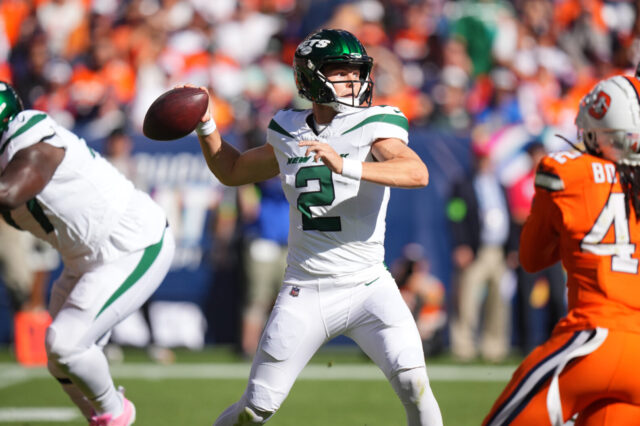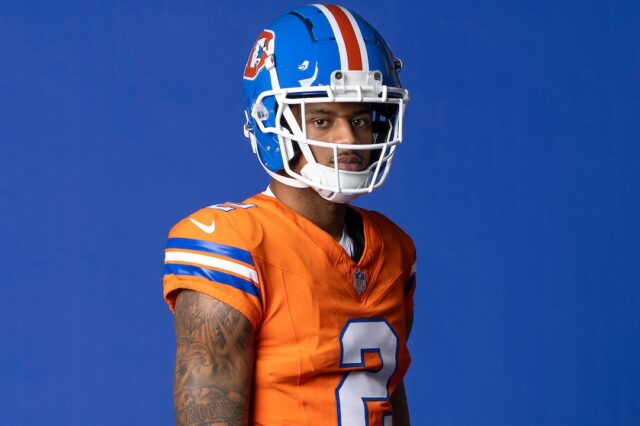As the NFL Scouting Combine comes to an end, football fans can now turn their attention fully towards free agency. The legal tampering period opens on Tuesday, with the market actually set to open on Thursday when the new league year begins. Checkbooks will be open, as a frenzy of signings are sure to come almost immediately.
As such, the Denver Broncos’ brass will turn their attention from the prospects coming out of college, back to the pros. With needs to fill and money to spend, they figure to be plenty active.
The Broncos very well could (and should) sign at least one offensive lineman. They will probably look for help along the defensive line as well. Heck, they may even lasso themselves a Cowboy. Regardless of how general manager John Elway decides to slice up the pie, the team will likely look decidedly different in a week’s time.
Sure, signings will trickle in after the initial rush, but shortly thereafter the Broncos’ sights will again be on those same prospects we saw at the combine. Picks will be made. More holes will be filled. Then, we’ll endure yet another free agent signing period.
There has to be a better way.
Back and forth, the team will be pulled in one direction, then another; and so the dance will go until the final roster is set. Maybe it’s the pragmatist in me, but I think it would make a lot more sense to hold the draft before free agency opens.
NFL teams that have sustained success, the dynasties even, aren’t built in free agency. The draft is where you find the meat. Free agency is simply the gravy. Let’s put the meat on the plate before we find something to top it with.
For the purposes of this column, I am going to lump college free agents in with draftees, as I feel they have more in common with those prospects than they do with veteran free agents, especially in terms to how they are scouted.
Look at the New England Patriots. Tom Brady was drafted by the Pats. So was Rob Gronkowski. Julian Edelman, same story. Malcolm Butler, undrafted free agent. The core of the Patriots didn’t join the team as veteran free agents.
The Broncos tell much of the same story. Von Miller, Demaryius Thomas, Shane Ray, Derek Wolfe and Matt Paradis are all key pieces of the Broncos’ future; all were also drafted by the Broncos. Add in Chris Harris Jr. and C.J. Anderson, who joined the team as college free agents, and that’s eight of Denver’s top 11 or 12 players.
While they played a large role in the success of the Broncos, Aqib Talib, DeMarcus Ware and Emmanuel Sanders are complementary players. They were brought in to complement, alleviate some of the pressure off of Harris, Miller and Thomas, respectively.
There are exceptions. Peyton Manning comes to mind; but at the center of most teams, you will find players that jumped straight out of college and into the uniform of the team they currently play for. Do you know how many NFL veteran free agent quarterbacks have won a Super Bowl with the team they signed with? Just two: Manning and Drew Brees.
It’s worth noting, when planning for the future (a future without Manning), that the Broncos selected a quarterback in the second round of the 2012 NFL Draft, mere months after signing Manning.
While Brock Osweiler proved he may have needed even more time behind Manning, you cannot honestly tell me Bradley Roby and Shane Ray weren’t ready to start last season, perhaps even sooner. They couldn’t, because veterans (Talib and Ware) stood in their way.
If people were given the chance to play when they were ready, it would open up money to address other needs – needs that couldn’t be crossed off the to-do list at the draft.
When looking to upgrade a roster, it’s shortsighted to plan free agents first. The long-term gains will come through the draft. In the wham, bam, thank you ma’am industry that is the NFL, it’s often about the here and now. It’s planning for later that separates the great from the good.
I am always one to strive for greatness.
Moving the NFL Draft up and free agency back would put the league’s priorities more in line with where they should be. It would change a club’s focus to long-term health and sustainability. Right now, teams are looking to address their needs through free agency, then fill in the gaps through the draft. It should be the other way around, prioritizing homegrown talent over aging veterans.
The top NFL players rarely hit free agency. The franchise tag ensures that much. The NFL wants teams to be able to keep their most prized assets; which typically come (you guessed it) through the draft.
When looking at the landscape of the NFL, homegrown talent comes first. It’s time to stop letting the draft come second.



